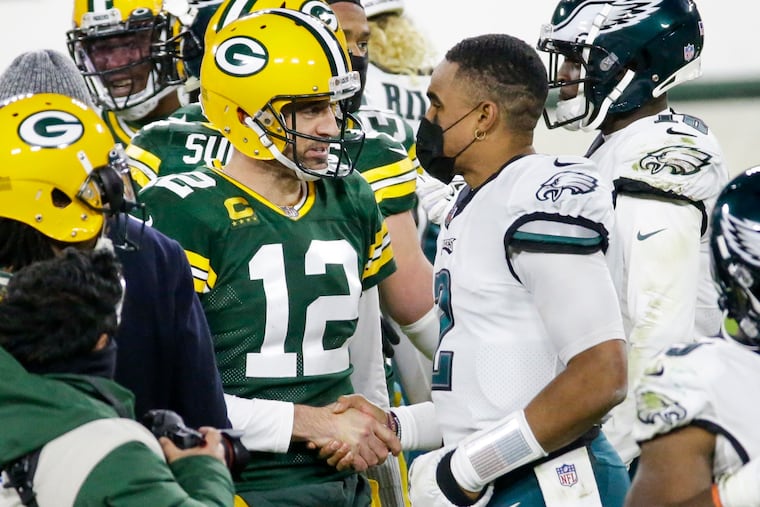Aaron Rodgers once explained why Jalen Hurts will face so much pressure this season with the Eagles | Mike Sielski
Rodgers hasn't given Jordan Love a shot to steal his job. Carson Wentz gave one to Hurts. But that's all Hurts or any young quarterback generally gets in the modern NFL: one shot.

Back in November 2016, back when Jalen Hurts was 18 years old and the first true freshman to start at quarterback for Alabama in more than three decades, back when nobody had to monitor Jeopardy! each night for tells and insights into what the NFL’s most valuable player might be thinking, Aaron Rodgers said some interesting things, as he often does. They were so interesting, in fact, that they’re relevant now, to Hurts and the Eagles, in ways that, quite obviously, no one could have foreseen then.
On a conference call with some media members here before an Eagles-Packers game, Rodgers contrasted the circumstances of his early career with those of promising quarterbacks these days. At the time, Carson Wentz was in his first season with the Eagles. He would start all 16 games for them, and it was taken for granted that he would be their long-term answer at quarterback. No such presumptions accompanied Rodgers’ entrance to the NFL. The 24th pick in the 2005 draft, he had spent three years as Brett Favre’s understudy before becoming the Packers’ starter. So something had changed over Rodgers’ 12 years in the league. Why weren’t teams waiting for quarterbacks to develop? Why were they quicker to play rookies immediately?
“To me, it seems it’s more of the necessity to win right away and that job security is maybe a little bit less than it was 12 years ago,” Rodgers said. “You’re seeing teams fire coaches after one year, after two years. I feel like, 12 years ago, the stigma was maybe you give a guy three years to get his program instituted and get his guys in there and see if they can win. … With the attention that our sport has and the way it’s grown in popularity, there’s a desire for these owners to win now, and if they’re not doing it, they’re going to make changes.”
Rodgers was right: The grace period that he got in Green Bay isn’t possible now. The league’s salary-cap structure and the increased demand from owners and executives for immediate returns on their investments won’t allow it. A franchise can more easily build a strong overall roster if it happens to draft a quarterback who can excel, or at least be competent, over his first 3-4 years in the league, because that quarterback’s first contract is so much more affordable than it was a decade ago. Plus, most owners and player-personnel directors want to find out as soon as possible whether they have a budding franchise quarterback. That way, they can sign him to a lengthy contract extension as soon as possible, before he drives up his value and their expenses even more.
Rodgers is smart enough to see all that. It helps explain why the Packers’ decision to select Jordan Love in the first round of last year’s draft so infuriated him. It helps explain why the Eagles’ decision to draft Hurts in the second round of last year’s draft so infuriated Wentz. And it helps explain why, once the Eagles benched Wentz last season, his days here were numbered.
No matter their financial and strategic commitment to Wentz, no matter their reasons for drafting Hurts when they did — acquiring an inexpensive backup, developing him and perhaps trading him for more assets — the Eagles couldn’t get around the basic facts of their decision. They had used a high pick on a young quarterback. One way or another, they were going to have to justify that move, that significant allocation of resources. And their public acknowledgment last year, after drafting Hurts, that they planned for him to be their No. 2 QB as a rookie reaffirmed something else that Rodgers had pointed out in ’16: Today’s quarterbacks are generally better prepared to play right away than those of previous eras were.
“They’re doing more in college with protection adjustments, run-pass options at the line of scrimmage, and checks than we probably were 12 years ago, when I was coming out of the draft,” he said. “So it’s been fun to see that development of quarterbacks coming in.”
Well, Rodgers has made clear these last few weeks, through his subtle and not-so-subtle expressions of disgruntlement, that it isn’t that fun. But at 37, with his remarkable talent and with a good team around him, he has done more than merely fend off Love. He has made the Packers’ succession plan look ludicrous.
» READ MORE: Howie Roseman and the Eagles win the NFC East’s NFL draft | Marcus Hayes
Wentz faced a similar test with Hurts. He failed. His play regressed. He wanted to leave. The Eagles accommodated him. Now Hurts will have his chance, under the same conditions that every first- or second-round quarterback entering his first or second NFL season confronts, with more pressure than people might first recognize. There’s no timeline here for him, and there will be little patience from Jeffrey Lurie, Howie Roseman, Nick Sirianni, and a franchise that could have as many as three first-round picks in next year’s draft. When it comes to football’s most important position, no one waits for anyone anymore. Jalen Hurts gets one shot at this. For his sake, he can’t afford to miss.